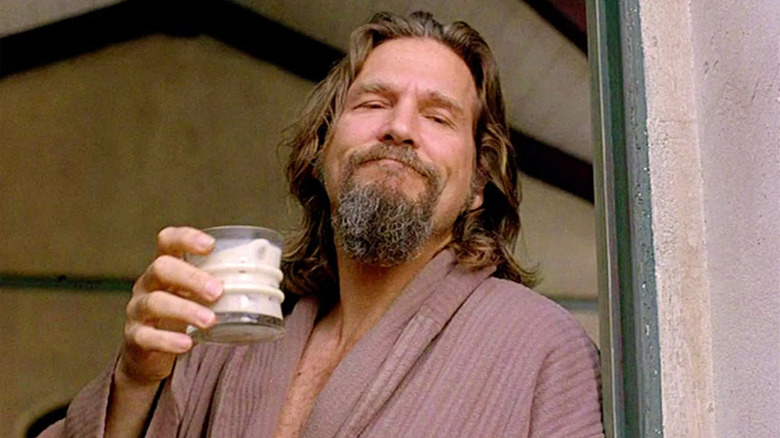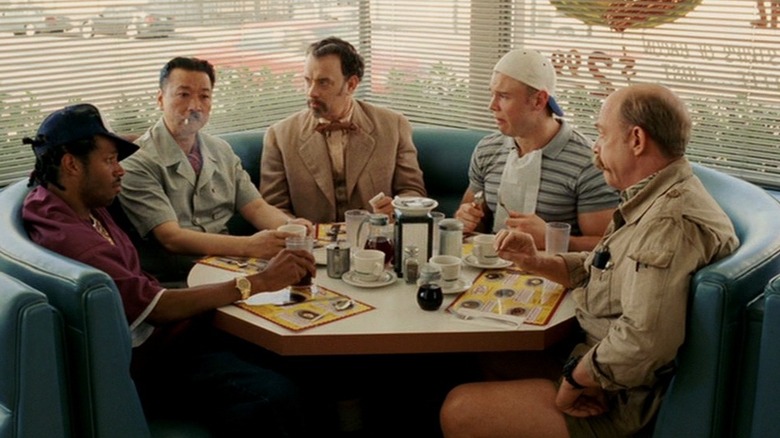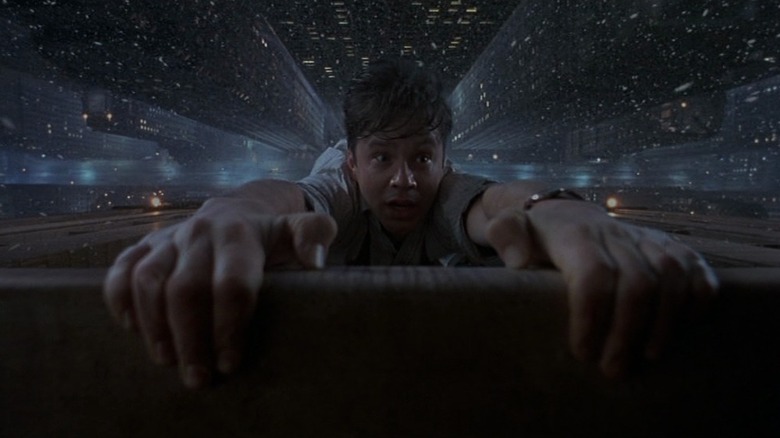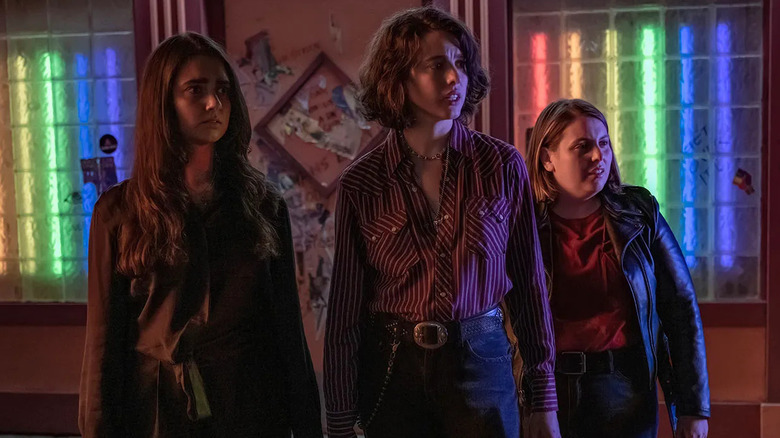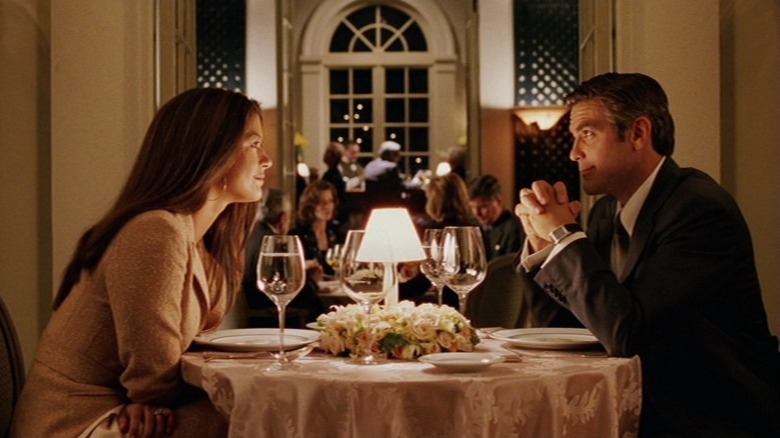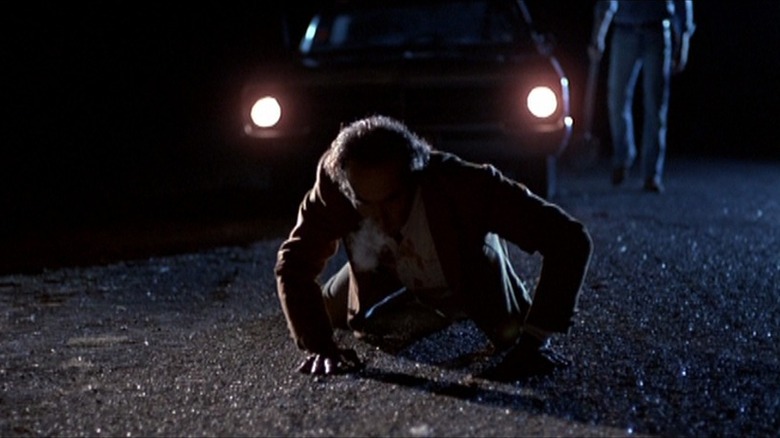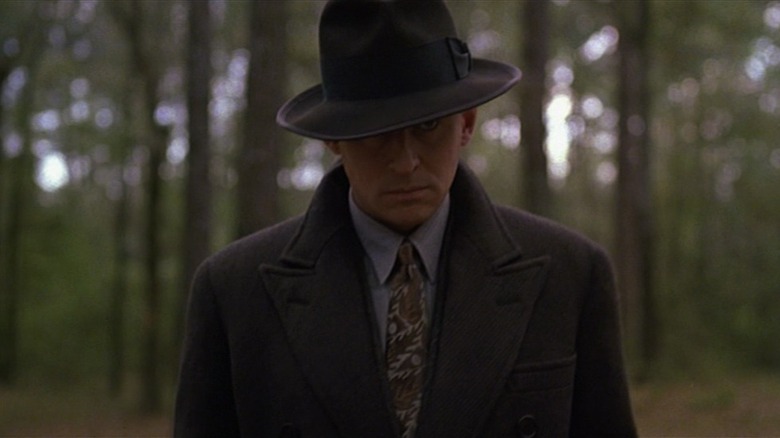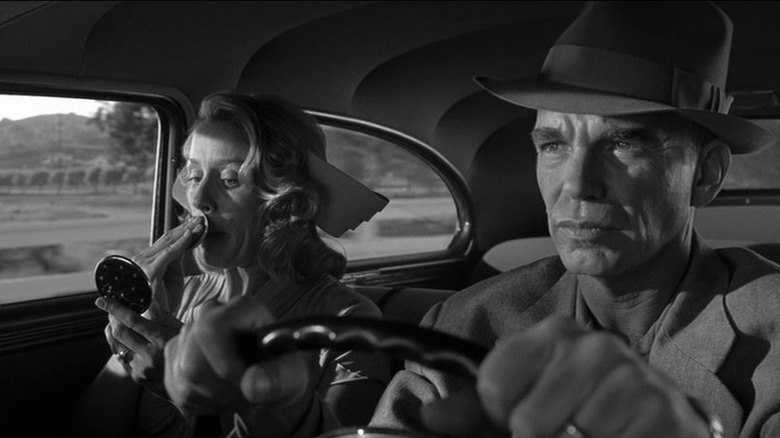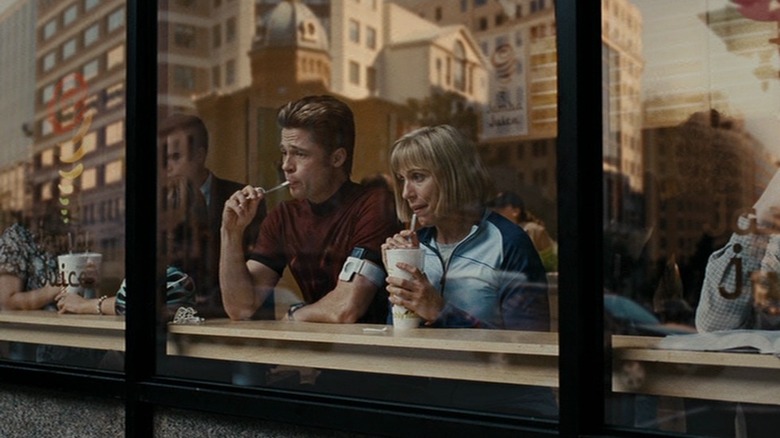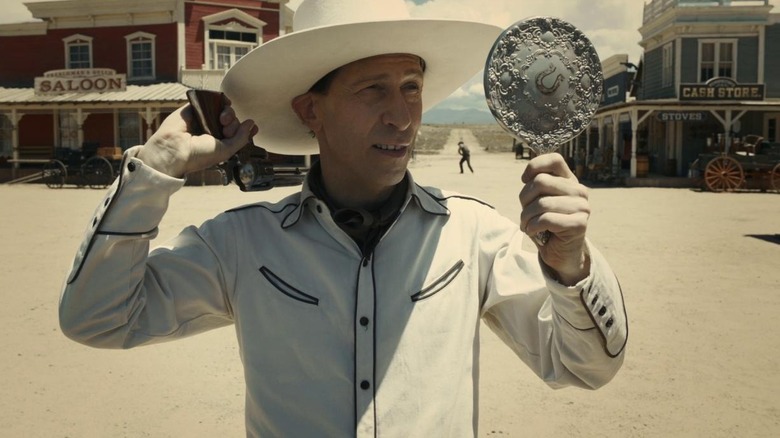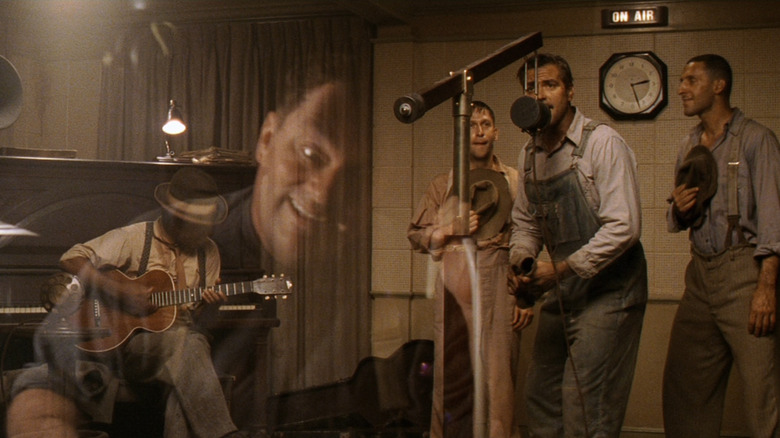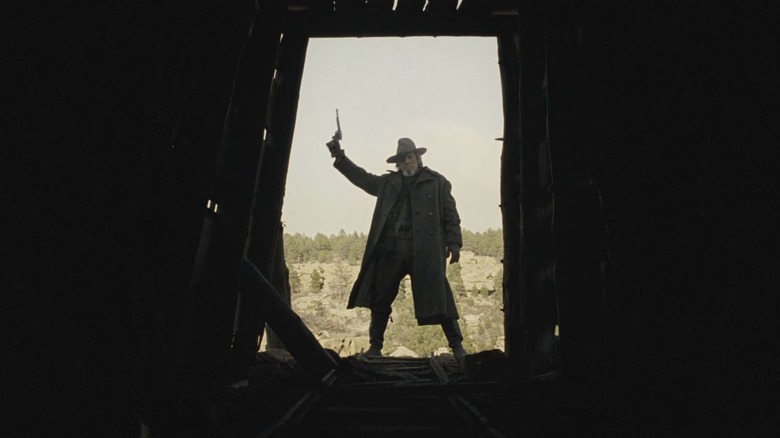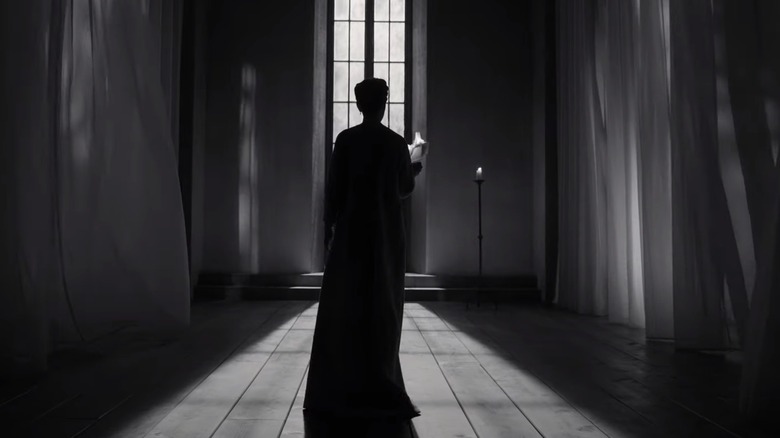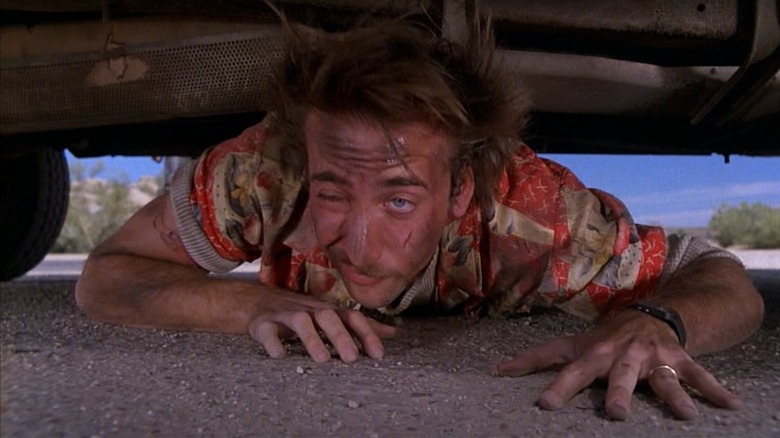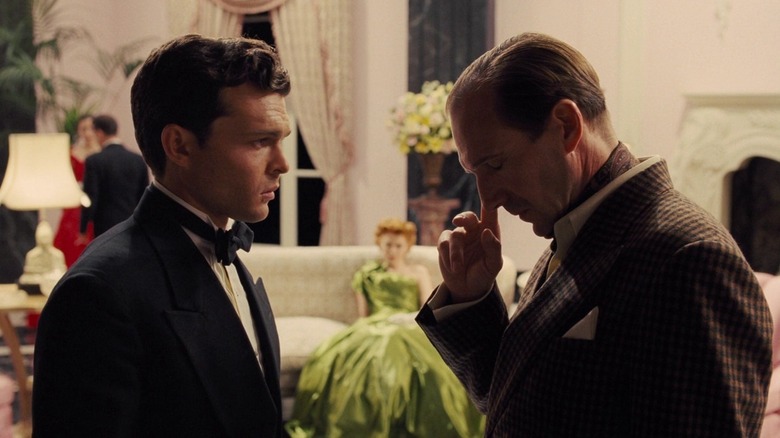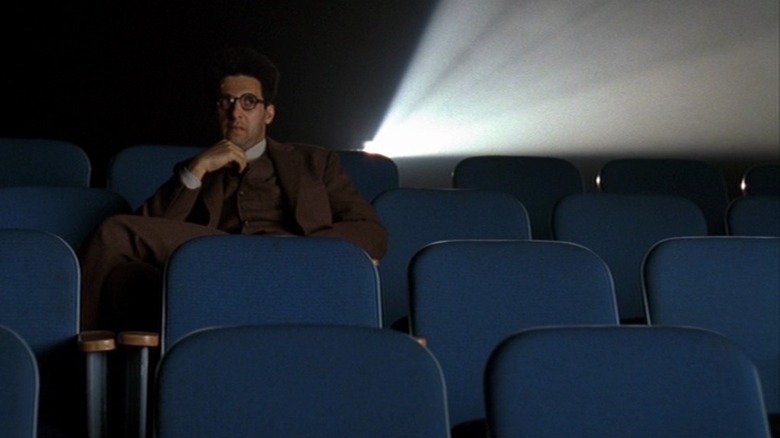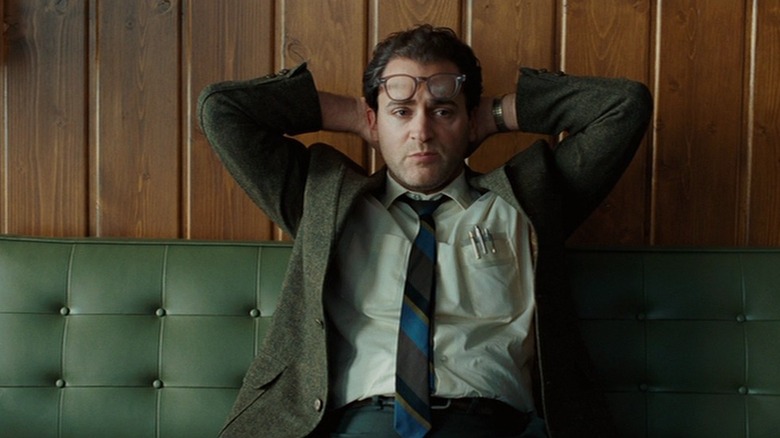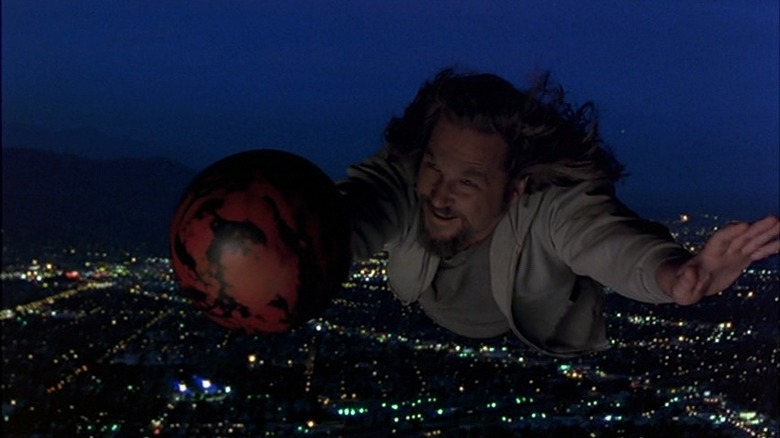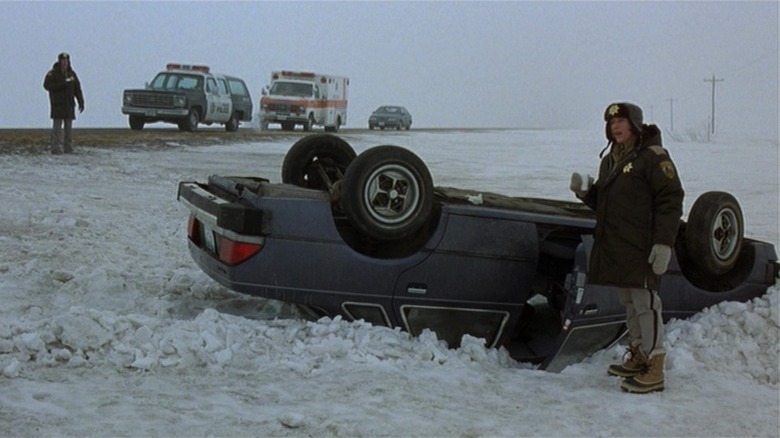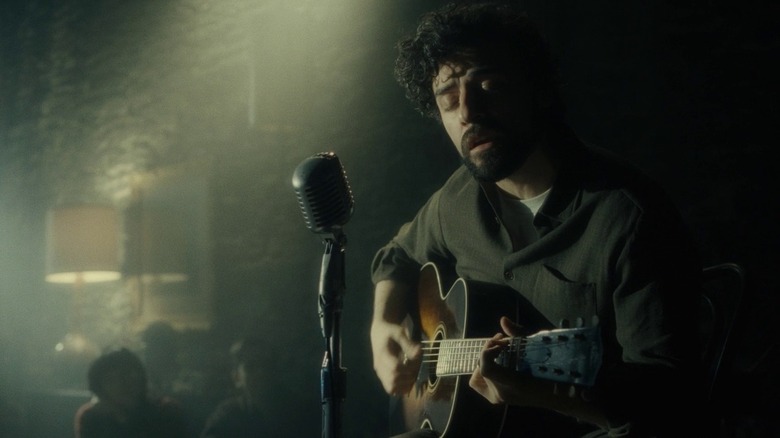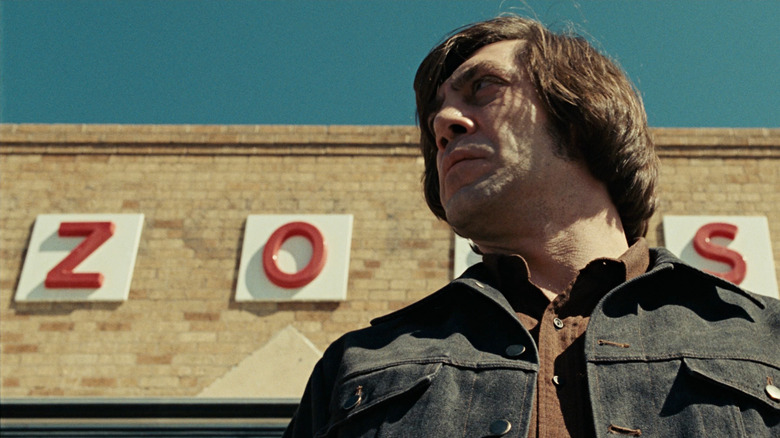The Coen Brothers Movies Ranked Worst To Best
There's no one working in cinema today with both the range and skill level of Joel and Ethan Coen. To find any good point of comparison, one would have to look back as far as the Hollywood studio era, far before the concept of an "auteur" assigned any kind of traceable artistry to the director's chair. No two movies they have ever made are the same, even when they contain similar genre trappings or share a general disposition toward the world. Across comedies, dramas, westerns, thrillers, mysteries, and just about any subgenre possible, they have excelled while also pushing the form forward in exciting ways.
Ranking any body of work with this many singular, daring masterworks proved a formidable task. Any other filmmaker would be lucky to make just one film as good as any among the Coen Brothers' 10 best. But now is as good a time as any to assess given that each brother has officially directed a film on their own — Joel with "The Tragedy of Macbeth" and Ethan with "Drive-Away Dolls." At this brief point of divergence before a planned reunion in their artistic career, here's how we think that film stacks up against the body of work from an unparalleled partnership.
20. The Ladykillers
There's only one film in the bunch that feels like an unmitigated disaster: 2004's "The Ladykillers." This remake of the '50s British comedy of the same name transposes the film's action of a band of dim-witted crooks trying to hoodwink an old lady to the American South. The broader studio comedy trappings really don't suit the Coen Brothers, though no one can say they — or Tom Hanks, with his thick Foghorn Leghorn accent and Colonel Sanders get-up as Goldthwaite Higginson Dorr, Ph.D. — are not swinging for the fences. They can never quite figure out the chemistry between Hanks and the odd mixture of characters assembled for the task ahead, which includes Marlon Wayans' janitor Gawain, J.K. Simmons' explosives expert Garth, and Tzi Ma's tunneling whiz known only as "The General."
Thankfully, the Coens would get better at remakes and retreads in time. But "The Ladykillers" just feels like it can never quite escape that odd match of concept and artist. At least we'll always have the Ealing original.
19. The Hudsucker Proxy
Unsuccessful though "The Hudsucker Proxy" may be, uninteresting it most certainly is not. The Coens poke holes in the rags-to-riches Horatio Alger myth through the story of Tim Robbins' Norville Barnes, an ambitious go-getter who rises from the mailroom to the C-suite of the Hudsucker Corporation. Through an ironic twist of fate, he parachutes to the top of the company by way of a perverse boardroom maneuver designed to tank their stock. Instead, Norville's idea for the hula hoop makes him and the company hotter than ever.
It's not short on ideas or inspiration, yet "The Hudsucker Proxy" does stumble a bit in execution. The film makes for a bit of a tonal jumble as the brothers' unavoidably wry tendencies clash a bit with their intentions of making a valentine to old Hollywood comedies. At the very least, it's fun to watch them be more playful with visuals on the larger-scale budget they were afforded here ... even if the downside of that freedom was that the film's limited audience made this a notorious box office bomb.
18. Drive-Away Dolls
Sometimes it's necessary to see a misfire to appreciate a masterpiece. The primary function of "Drive-Away Dolls," Ethan Coen's first solo outing as a narrative director, may well be to illuminate how great the brothers' early triumph "Raising Arizona" is. That same temperament of live-action Looney Tunes seems to be the aim in this madcap adventure that feels like it's trying to stuff as many genres as possible into its compact 84 minutes (and give it a queer twist, to boot). What starts as a road trip comedy between Margaret Qualley's free-wheeling Jamie and her more reserved friend, Geraldine Viswanathan's Marian, quickly spirals out of control when they realize something nefarious lies in the trunk of their rental car.
This is the rare movie that could stand to be longer so viewers have the time to luxuriate in the wild world. Ethan Coen and his wife Tricia Cooke, his co-writer, briskly rush their way through the story and leave plot and characters alike undercooked. The duo's detour into political intrigue never has the space to fully develop in either seriousness or silliness. The friends' unwitting evasion of their dim-witted pursuers has flashes of classic Coen Brothers comic crime capers, but it never seems to grasp what makes them great. Like "The Man Who Wasn't There" with the film noir, "Drive-Away Dolls" can feel rather passionless even as it occasionally crackles with moments of corny wit and cartoonish violence.
17. Intolerable Cruelty
It's clear the Coens sought a contemporary take on the classical Hollywood screwball comedy with "Intolerable Cruelty." Indeed, there are the seeds of something really special in the sparks that fly between George Clooney's divorce attorney Miles Massey and Catherine Zeta-Jones' gold-digging Marilyn Rexroth. But despite two very game participants in this old-school battle of the sexes matchup, something doesn't quite gel here.
The comedy feels a bit miscalibrated by the Coens, whose penchant for the occasional zany outburst disrupts the more refined laughs. Clooney is a master of self-deprecating humor that undercuts his suave demeanor, but he can never reconcile the cartoonish antics the script forces him to engage in with the more buttoned-up nature of his character. The film's many wild supporting characters, ranging from Cedric the Entertainer as a "gotcha!" game show host to Billy Bob Thornton as an oil baron, all feel a bit like they're from different (if entertaining) movies. Though not a total write-off, "Intolerable Cruelty" feels like a missed opportunity for something more. The parts are there, but they don't cohere into something greater like most Coens works do.
16. Blood Simple
As with many directorial debuts, "Blood Simple" feels like more of a blueprint for what's to come than a fully-baked film. It's impressive to see how many of the Coens' recurring fascinations are already on display here: simple people caught in webs of crime, genre pastiche, cruel irony, dark humor, Frances McDormand. A story of a Texas bartender, Ray (John Getz), who gets caughts in a sordid entanglement of cheating and murder that quickly spirals into something far bigger than he could possibly imagine. Yet, by Coen standards, this yarn feels impressively contained and more coiled than their usual explorations of where warped morality can lead.
When judged against the high standards of what was to come for the Coens, this feels a bit rudimentary and elementary. But as a starting point for any filmmaker, "Blood Simple" is quite an accomplished piece of work with a mastery of mood, story, and image right out of the gate. At the very least, it's a fascinating prism through which to view the decades to come for the Coen Brothers.
15. Miller's Crossing
"I'm talkin' about ethics," begins Jon Polito's Johnny Caspar in "Miller's Crossing." In case anyone missed the memo, the Coens announce themselves as capital-S "Serious" filmmakers with their third directorial venture. Their not-so-Roaring Twenties chronicle of organized crime is handsomely mounted, sure, but it's also a bit pompously ponderous. As Gabriel Byrne's Tom Reagan plays both sides of a dispute between rival ethnic gangs against each other, the Coen Brothers have a tendency to blare their themes as tensions blaze. While the filmmakers normally find a way to organically smuggle their idiosyncrasies into a film, they make themselves all too present here through grandiose choices in many self-consciously stylized sequences. It's perfectly fine as a mob movie and by no means a disaster, but the Coens' heavy-handedness appears and distracts when it reaches for something bigger than just the genre.
With time, they got better at weaving those idiosyncracies more intricately into the texture of their yarns, such that a declarative streak would no longer be necessary. In later Coen works, the meanings of the stories speak for themselves. In "Miller's Crossing," the characters speak the meaning of the story.
14. The Man Who Wasn't There
The Coens' collaboration with cinematographer Roger Deakins is one for the books. While perhaps impossible to pick his most impressive contribution to their cinema, it might just be his crisp black and white photography in "The Man Who Wasn't There." As the Coens' homage to classic noir teeters over into outright recreation, Deakins' mastery of light and shadow is essential to setting the mood as Billy Bob Thornton's stoic barber gradually goes over to the dark side. The film might as well have a checkbox of noir hallmarks to hit: blackmail, embezzlement, murder, laconic narration, post-war moral failings and a pervasive sense of emptiness. (All it needed was a femme fatale for noir bingo!)
It's a shame that the film largely fails to match Deakins' visuals. "The Man Who Wasn't There" feels pitched to existing genre fans without expanding or exploding conventions as the Coens do in more subversive efforts. Their austere tribute is a film to admire more than embrace, although the overarching sense of hollowness does prove an oddly fitting companion to the thematic content of the work itself.
13. Burn After Reading
Talk about whiplash after "No Country for Old Men" — within a year of their best picture-winning triumph, the Coens were back with the bonkers "Burn After Reading." This espionage caper gets many stars at their absolutely loopiest: George Clooney once again sending up his debonair aura as a bumbling oaf, Brad Pitt playing a self-assured doofus, Frances McDormand undercutting her traditionally stern persona as an earnest but hapless gym employee obsessed with trying to alter her looks through plastic surgery. Each becomes ensnared in the intrigue around the memoirs of John Malkovich's Osbourne Cox, an embittered ex-CIA analyst felled not by intelligent people but by fools.
This is a ridiculous comedy about ridiculous people doing ridiculous things. It's both fitting and a bit frustrating that the Coens use this as a vehicle for what might be the most nihilistic read of people in their entire body of work. In recent years, the film's justified shrug of an ending, which depicts governmental and societal failure to learn anything from a compounding set of mistakes has become something of an Internet meme. If only the Coens' incisive understanding of humanity proved wrong here ... but they rarely miss. The relevance of "Burn After Reading" will likely only increase before it ever begins to fade.
12. The Ballad of Buster Scruggs
The anthology format turns out to be quite suiting to the Coens' sensibilities. "The Ballad of Buster Scruggs" feels like a greatest hits album in many ways, allowing them to show the versatility and range of their artistry. Rather than blending tones as they do within a single feature, the brothers compartmentalize them into single-story segments. Some follow the larger-than-life exploits of a single character ("The Ballad of Buster Scruggs," "All Gold Canyon"), many stretch out a joke or a mood to intriguing effect ("Near Algodones," "The Mortal Remains"), while others do something more like a compressed three-act narrative structure ("Meal Ticket," "The Girl Who Got Rattled").
There's a bit of varying quality among the component parts of "The Ballad of Buster Scruggs," with the Zoe Kazan-starring penultimate chapter "The Girl Who Got Rattled" providing the most complete and satisfying experience of the half-dozen. But even if this feels a bit like the Coens just playing around in an artistic sandbox with Netflix's money ... that's not a bad thing! After several outings in the American West, the brothers prove they're old hands in the genre capable of firing across multiple cylinders.
11. O Brother, Where Art Thou?
The legacy of "O Brother, Where Art Thou?" as a film may now be dwarfed by the smashing success of its soundtrack, a collection of country and bluegrass tunes that won the Grammy Award for album of the year. The movie is more than just a collection of scenes that provide an excuse for an album, though. The Coens make music an integral part of their film, a Depression-era adaptation of Homer's "The Odyssey" ... never mind that the filmmakers say they never actually read the epic poem, a painfully on-brand admission that blurs the lines between reality and mythology just as they do on-screen.
For those who did pay attention in high school English class, however, the hijinks of three chain gang escapees on a hunt for treasure present any number of analogs to the classic text for spotting. The cyclops becomes a one-eyed crook with ties to the KKK; the sirens become enticing women washing clothes in a river. The noble journey home is a little bit more open to interpretation because, in classic Coens form, there are few true and incorruptible heroes. For everyone else less familiar with the text, however, "O Brother, Where Art Thou?" is just a fun movie that's easy on the eyes as it is on the ears.
10. True Grit
Though the Coens have waxed classical in their genre stylings from time to time, nowhere do they achieve those ambitions so effortlessly as they do in "True Grit." This adaptation of Charles Portis' novel of the same name, which was also made into a film in 1969 starring John Wayne, also feels as if it could have been made within the genre's mid-century heyday. The film rings with an uncommon sincerity and earnestness for the Coens, though it's not without a caustic streak as expressed by the surly U.S. Marshal Rooster Cogburn (Jeff Bridges). He joins the spunky teenager Mattie Ross (Hailee Steinfeld), albeit reluctantly, in pursuit of the notorious criminal who claimed her father's life. They face many a trying obstacle to locate their target, although the Coens offset that grimness with Cogburn's wisecracks as well as some laughs at the expense of the self-serious Texas Ranger LaBeouf (Matt Damon, laying the twang on thickly yet appropriately).
There's terror, tenacity, and tenderness alike in this straightforward yet stupendous film. Just because it's not out to invert any conventions or venerate a hallowed form does not make "True Grit" any less special an achievement. Upending a genre takes skill, but so does upholding it.
9. The Tragedy of Macbeth
"The Tragedy of Macbeth," the first film directed by one Coen brother without the other's involvement, makes its biggest change to the Shakespearean text through the simplest of decisions: casting. By having sexagenarian thespians Denzel Washington and Frances McDormand in the roles of Macbeth and Lady Macbeth, parts traditionally played by performers several decades their junior, the entire nature of the characters' relationship to power shifts. Rather than a cautionary tale about the corrosive pursuit of ambition at all costs, the focus becomes on the weariness of a couple who grasp for power as their window of opportunity to seize it shrinks. Just that animating presence alone unlocks new avenues of understanding within a play that's been performed and parsed for centuries.
Joel Coen grants audiences the rarest of gifts, that feeling of hearing Shakespearean dialogue as if for the first time, and he matches this intellectual sensation with a visual one through expressionistic cinematography and set design. If you get lost in the old English verse, the evocative visuals that underscore and undercut the dialogue will ensure it's impossible to miss an emotional beat. No Ethan, no problem for "The Tragedy of Macbeth."
8. Raising Arizona
For all the talk of Nicolas Cage's increasingly unhinged performances as of late, he may never top his turn for the Coens in "Raising Arizona." As H.I. McDunnough, he's the closest thing to a live-action Looney Tunes cartoon ever committed to the screen, a moronic yet magnetic criminal with a desire for a rosy future but none of the patience or skill to achieve it earnestly. In the film, he hatches a hair-brained scheme to kidnap a quintuplet from a wealthy family since he and wife Ed (Holly Hunter) — a former law enforcement officer, no less — prove infertile. Even if you think you know what might happen with a crazy concept like this, the Coens take your preconceived notions, dip them in motor oil, and flick a match at them.
The Coen Brothers are at their most madcap fun here, channeling vivacious and fun energy like nowhere else in their work. But just because the antics are so entertaining doesn't mean they lose their bite or insight. "Raising Arizona" is a wry and piercing look at what family means, whether conceived, stolen, or arrived at through some other dubious means. H.I.'s probing narration alone ought to make clear that this film has far more on its mind than a standard-issue studio comedy.
7. Hail, Caesar!
If there's any film among the Coens' work ripe for reevaluation and reclamation, it's "Hail, Caesar!" This story of studio boss and fixer Eddie Mannix (Josh Brolin) is pitched somewhere between their dominant modes of highly literate genre play, ironic comedy, and bitter moral drama — yet remains somewhat elusive to viewers given how it slides slipperily between these styles. That nebulous quality is precisely what makes the film such a shape-shifting delight. It's a tribute to the possibility, not so much the history, of cinema.
The Mannix character allows the film to toggle between different film sets on the studio lot, providing a glimpse into any number of styles ranging from Biblical epics starring George Clooney's gullible Baird Whitlock to Gene Kelly-like musical numbers featuring Channing Tatum's Burt Gurney. And, with regards to their outright comedic work, the funniest sequence in any Coens movie is easily the futile attempt of Alden Ehrenreich's Hobie Doyle to deliver the line "would that it were so simple" to the satisfaction of Ralph Fiennes' uptight director Laurence Laurentz. With each stop he makes to check in on his stable of stars, the Coens makes clear the business — and coercion — necessary for movie magic that is always lurking just outside the frame.
6. Barton Fink
Once this deep into the Coens' filmography, it's no longer hyperbole to start throwing around the M-word: masterpiece. Their Palme d'Or winning triumph, 1991's "Barton Fink," marks the first — but by no means the last — time where style, story, and sensation synced perfectly for the filmmaking duo. As John Turturro's eponymous writer struggles to make the leap from Broadway to Hollywood, the film shifts genres and tones as quickly and unpredictably as his mind functions. While the film might initially present as a fairly straightforward tale of writer's block to begin, "Barton Fink" zigs and zags between a number of characters, symbolic images, and thematic developments that further increase the sensation of claustrophobia and mania.
The Coens' ability to synthesize so many styles and sensibilities within the same film and have the work feel inherently coherent is nothing short of a marvel. "Barton Fink" has all the makings of a calling card for the brothers, and three decades later, their breakthrough work has not lost its ability to stun and surprise.
5. A Serious Man
The Coens are not exactly personal filmmakers, but they pull persuasively and potently from their own backgrounds in "A Serious Man." The level of detail as they recreate their foundational milieu of a midwestern suburban Jewish community is remarkable, even by their own exacting standards. The brothers wrestle openly here with the religious undercurrent flowing underneath their work through a retelling of the book of Job. Woebegone math professor Larry Gopnik (Michael Stuhlbarg) tries to be a good and upright person and yet still finds his life little more than a parade of misery. When he tries to engage spiritual leaders to explain the tragedy, they offer little more than platitudes and parables. And while these misadventures bring him pain, the dark humor cannot help but tickle the audience observing his struggles from afar. The brothers are no strangers to deploying music in their films to great effect, and here it's Jefferson Airplane's "Somebody to Love" that speaks the movie's message better than any scripture: "When the truth is found to be lies / and all the joy within you dies / don't you want somebody to love?"
The Coens earn their shrug at the eternal question "Why do bad things happen to good people?" — they're simply parroting back the inexplicable nature of divine justice provided by their faith tradition. "A Serious Man" refuses the easy path of embracing or condemning Judaism or religion at large in favor of issuing an open-ended question to an unanswerable dilemma. The Coens provide a clear-eyed look at what religion can and cannot offer humans in our time of need.
4. The Big Lebowski
How many movies can say they inspired an entire religion? The brilliance of the Coens' stoner neo-noir "The Big Lebowski" is that you can engage with it on levels spiritual, sardonic, and silly alike. Jeff Bridges' slacker and stoner Jeffrey Lebowski — better known as "The Dude" — will forever rank as the brothers' most iconic cinematic creation. Though he's easily reduced to quotable aphorisms (that those in "Dudeism" take as a kind of gospel), Lebowski serves as a zen guide through one of the Coens' wackiest screenplays. This Chandler-inspired dark comedy updates the neo-noir for the early '90s in Los Angeles, taking audiences on a wild ride spanning from tense ransom stakeouts to euphoric Busby Berkeley-inspired musical reveries.
"The Big Lebowski" might feel random or bizarre for its own sake, but don't let the lackadaisical lead fool you. This ranks among the most meticulously constructed of the Coens' projects. They resolutely deny any improvisation helped shape The Dude, insisting that every word and pause reflect their careful consideration of the character.
3. Fargo
Nowhere do the Coens navigate the complexities of humanity with more depth and insight than in "Fargo." This film shows people resorting to grisly violence when backed into a corner, yet it also depicts people holding onto hope after seeing those base impulses play out. Is violence our innate state? Is optimism naive? Perhaps all can be true, they suggest, depending on whose vantage point you look through.
The film can hold the lived experiences and values of crooked car salesman Jerry Lundegaard (William H. Macy) as he digs a deeper and deeper hole trying to extort his father-in-law, two contract criminals (Steve Buscemi and Peter Stormare) reluctantly willing to do his dirty work, and pregnant police chief Marge Gunderson (Frances McDormand) trying to make sense of the senseless. The film constantly swerves in unexpected directions — heck, Marge Gunderson doesn't even show up until midway through — without ever feeling disjointed. It's rare to see any movie convincingly span the range of humor of "Minnesota nice" to the horror of blood splayed across white snow to impromptu moralizing about the value of human life without ringing a false note.
2. Inside Llewyn Davis
The unlucky loser is a staple of the Coen Brothers' work, and the travails of this figure take center stage in "Inside Llewyn Davis." As the titular folk singer, Oscar Isaac captures the passion and desperation of an artist who wants for nothing but the pursuit of his craft. He's made to struggle not only for not selling out to corporate record labels but also simply because he came along a little too early for the scene to take off. With every small breakthrough in the music world (a vivid and toe-tapping recreation of the pre-Bob Dylan New York folk scene), the ghosts of past mistakes and choices yank him several steps back. It's as if Llewyn is in a race to outrun himself, trying with all his might to marry professional stability and artistic satisfaction.
The film is both cruel and compassionate to Llewyn as he tries to scrape by on the margins to keep his dream alive. Like any classic Coen story, it's a little chilling but also oddly comforting to be reminded that skill and talent only get us so far. Though our decisions play a larger part in our fate, the filmmakers use their protagonist's winding journey to show how we're all dependent on the whims of timing and chance.
1. No Country for Old Men
As shown by the broad range of their filmography, it's questionable whether there can even be such thing as a "Coen Brothers movie." Even still, it does seem a bit weird to select "No Country for Old Men" as the filmmakers' best effort given that it manages to feel like an outlier amidst a body of work already full of them. This brutally effective thriller about a man on the run (Josh Brolin's Llewelyn Moss) from a relentless villain who epitomizes unflinching evil (Javier Bardem's Anton Chigurh) taps into something elemental, rather than merely incidental, about fate and decisions. One step behind Chigurh's dogged pursuit of Moss is Tommy Lee Jones as the aging sheriff Ed Tom Bell, trying his best to parse a case that feels as if it portends an age of lawlessness triumphing which he is unable to stop.
This plaintive adaptation of Cormac McCarthy's tricky prose stylings effectively translates his sparseness for the screen. With few words, McCarthy can conjure a struggle that is larger than life, and the Coens find a cinematic language to invoke a similar sensation. The normally noisy Coen Brothers go quite silent in "No Country for Old Men," dwelling in between the valleys of large events to wring an unbearable tension from them. The uncharacteristic minimalism for the Coens leads to maximum impact — a note-perfect film that lingers in the mind forever.
